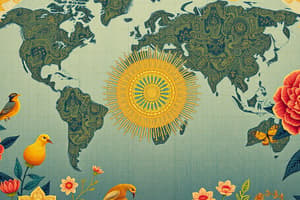Podcast
Questions and Answers
What is the primary definition of globalization?
What is the primary definition of globalization?
What are the essential components of globalization as identified in the text?
What are the essential components of globalization as identified in the text?
During which period did Globalization 1.0 primarily occur?
During which period did Globalization 1.0 primarily occur?
What driving force characterized Globalization 2.0?
What driving force characterized Globalization 2.0?
Signup and view all the answers
How does globalization impact economic policies?
How does globalization impact economic policies?
Signup and view all the answers
What negative effect is associated with globalization?
What negative effect is associated with globalization?
Signup and view all the answers
What does the term 'services' refer to in the context of globalization?
What does the term 'services' refer to in the context of globalization?
Signup and view all the answers
Which of the following best describes the concept of economic interdependence?
Which of the following best describes the concept of economic interdependence?
Signup and view all the answers
Study Notes
Globalization
- Globalization is the process of people, ideas and goods spreading throughout the world, increasing interaction and integration between cultures, governments and economies.
- Globalization increases the amount of goods, services and labor that flows between countries.
- Goods are physical objects that people want
- Services are actions that satisfy wants and needs through people’s efforts
- Capital is financial wealth used to start or maintain a business.
- Increasing economic interdependence means economic policies in one nation can increasingly affect economic conditions in other nations.
- Innovations from Globalization have both positive and negative effects, including environmental and moral concerns.
History of Globalization
- Globalization 1.0 (1492 - 1800s): Exploration, Imperialism and Colonialism; Silk Route; World was large to medium in size.
- Globalization 2.0 (1800 - 2000): World: Medium to Small; Driving Force: Multinational Companies.
- Globalization 3.0 (2000 - Present): World: Small to Tiny; Driving Force: Focus on individuals, individuals and groups becoming geographically independent.
Essential Questions
- What are the rules and practices of global trade?
- How can fair trade principles impact people, communities and the environment?
- How does unemployment affect the economy and those who are employed?
Studying That Suits You
Use AI to generate personalized quizzes and flashcards to suit your learning preferences.
Related Documents
Description
This quiz explores the concept of globalization, its historical phases, and its impact on economies and cultures. Participants will examine the positive and negative effects of increased global interaction and interdependence. Test your knowledge about the evolution and implications of globalization.




